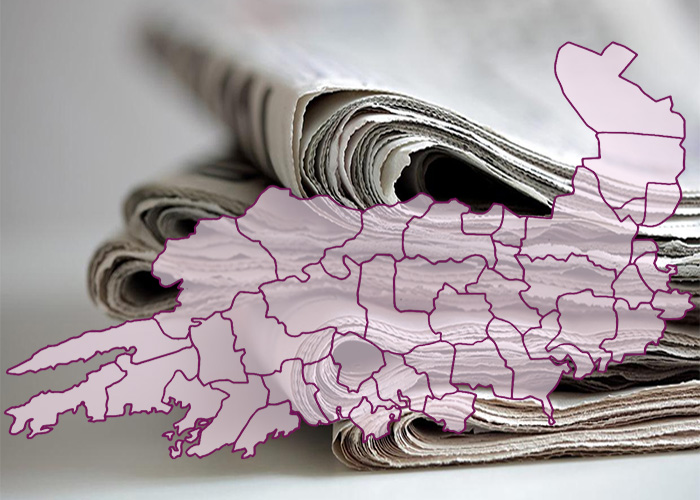Preamble
The Mission of the Catholic Church is to preach the good news of Jesus Christ to people everywhere. To further that mission the local Church relies on the advice and support of people expert in certain areas, and the Parish Finance Committee is one such example. Diocesan and parish finance committees play a vital role in the administration of ecclesiastical goods and properties. Their overall mission of administration and management must be in harmony with the Church’s overall mission of bringing Christ’s message of salvation to people. A spirit of partnership and collaboration is essential to the effective working of such committees.
Canon 537 of the Code of Canon Law requires each parish to have a Parish Finance Committee.
 Stewardship
StewardshipThe statutes which follow are intended to assist the effective functioning of Parish Finance Committees in the Diocese of Cork and Ross.
Norms
- The Parish Finance Committee advises and assists the Parish Priest/Administrator in the administration of the ecclesiastical goods of the parish in a spirit of service to God and his people.
- The Parish Finance Committee shall advise the Parish Priest/Administrator in all areas pertaining to the financial management and administration of parochial assets.
Parish assets include:- Property comprised of land, buildings and associated rights which are vested in diocesan trustee companies who are charged with the administration of these.
- Equipment and contents of parish properties and offices.
- Sacred vessels and artifacts, church plate, vestments and requisites for the celebration of the sacraments and all moveable items in churches and halls.
- Financial assets, including investments and bank accounts.
- The competence of the Parish Finance Committee pertains to the following areas:
- it shall assist the Parish Priest/Administrator in compiling an up-to-date, comprehensive inventory of all parochial property, goods and equipment. A copy of this is to be kept in the parish and another lodged in the diocesan archives. It is to be updated annually at the same time as the parish report to the bishop.
- it shall, with the assistance of a sub-committee, if desirable, assist in making projections of income and expenditure for the parish. Throughout the year, the Parish Priest/Administrator shall, with the help of the Parish Finance Committee, monitors the income and expenditure of the parish in the light of the agreed budget or projections.
- it shall assist with putting in place for the parish a book-keeping system which conforms to best accounting practice and the diocesan norms regarding parish finances and accounts. The financial year for parishes shall be the calendar year to Dec 31st. It shall help to ensure that the parish complies with all appropriate civil law.
- The Committee shall assist with keeping parishioners informed of the financial and asset portfolio of the parish through an annual report to parishioners. This report shall follow the standard provided by the bishop and shall be made available to parishioners before March 31st of the following year.
- The Committee shall also assist with preparing the Annual Parish Financial Report for the Bishop. The annual deadline for the return of this report is provided by the bishop.
- Through its prudent advice, Parish Priests /Administrators shall ensure that the ownership of Church goods and all Church properties are safeguarded. Special attention is needed to ensure that adequate insurance is in place.
- The Finance Committee shall help to ensure that there are adequate supervisions and controls in place for collections and handling of cash.
- It shall advise the Parish Priest/Administrator on the acquisition and lease/sale or other disposal of assets – without prejudice to the provisions of current diocesan guidelines.
- The Parish Finance Committee shall also advise and assist the parish in its fundraising policy.
- In accordance with Canon 532, the Parish Priest /Administrator, not the Parish Finance Committee, represents the parish in all legal matters.
- The Parish Finance Committee shall not be an employer.
- The Parish Finance Committee shall not be considered the legal owner of parish assets.
- The Parish Finance Committee is distinct from any exclusively fundraising committees, even of a permanent or official nature, which may be in the parish. It should, however, under the direction of the Parish Priest/Administrator, work closely with any such committee, to ensure the proper execution of the agreed fundraising policy for the parish.
- The Parish Finance Committee is likewise distinct and separate from the Parish Pastoral Council or Parish Assembly. However, ongoing communication between these bodies is essential.
- Each parish shall have one Parish Finance Committee for the whole parish.
- Where a parish has more than one church, each with its own ‘area’, each area should be represented by at least one member on the Parish Finance Committee.
- The Parish Priest/Administrator and Curate(s) in the parish are ex-officio members of the Parish Finance Committee.
- The curate(s) shall attend all meetings when possible.
- Priests shall continue as members of the Parish Finance Committee for the duration of their parish appointment.
- The Parish Finance Committee, in addition to its priest member(s) shall have at least four lay members.
- The Parish Priest/Administrator, in consultation with the other priest(s) of the parish and with suitable lay advisers, as he may see fit, shall appoint the members of the Committee.
- Lay members of the Parish Finance Committee, shall be parishioners of the highest integrity and shall be competent in management and financial matters.
- The term of office of the lay members of the Parish Finance Committee is to be three years. Lay members, on completion of their second consecutive term of office, are ineligible for immediate reappointment but may be reappointed after three years.
- The Parish Finance Committee is to meet at least three times a year.
- The Parish Priest/Administrator or his delegate, is to be the Chairman of the Parish Finance Committee.
- At its first meeting, the newly-appointed Parish Finance Committee shall appoint a Secretary, who shall keep the Minutes of all meetings.
- Likewise, at the first meeting also, the members shall be given an accurate picture of the assets of the parish, including the current financial position. A copy of diocesan norms regarding parish finance is a to be available to each member.
- They shall be informed of the policy of the Church and of the Diocese in respect of the administration of Church goods, including the role of the diocesan trustee bodies.
- In this diocese, its attention must be drawn to the banking and investment policies of the diocese, the Special Diocesan Collections and Diocesan Committees dealing with finance and property.
- Attention must also be drawn to the regulations that govern the stewardship of diocesan and parochial funds as promulgated by the bishop.
- A quorum for meetings of the Committee is to be one half of the members and the Chairperson.
- Members of the Parish Finance Committee are required to keep confidential matters discussed at meetings, unless otherwise agreed at a formal meeting by the Parish Finance Committee.
- Special diocesan collections announced by the bishop are to be taken up at all public Masses in the diocese.
- A list of these collections is provided annually by the diocesan office.
- The special collections are to be taken up as separate collections and lodged to the designated accounts.
- When a parish does not have a parish priest or administrator, the Parish Finance Committee is suspended and may be confirmed by the new Parish Priest/Administrator.
Appendix 1: Accounting Protocols [1]
- Administration of Accounts
- The Parish Priest/ Administrator/Priest-in-charge shall keep a detailed record for each account (either on paper or on computer) or ensure that another delegated person does. These records shall be available to the bishop or his delegate upon request.
- The records should be maintained diligently and contain up-to-date and detailed information for each transaction, incl. date, name, description of item, reference number.
- Cheque stubs and lodgement slips should also be retained in the parish. Invoices and receipts should be requested from suppliers before payment and these must be maintained in the parish for at least six years from the date of issue.
- The parish accounts are to be used exclusively for parish related transactions.
- Bank Account Mandates and Signatories.
- The bank mandate governing each account must provide for three signatories.
- The mandate must specify that at least two of the signatures are required on each cheque and each transaction.
- At least one of the signatories must be a lay parishioner and (s)he should serve for a term not longer than three years.
- A copy of the mandate should be retained in the parish and a copy of each new or revised mandate must also be sent to the Bishop’s Office.
- Signatories shall not sign blank cheques. (Before a cheque is signed, the payee and amount should already be completed.)
- Permission for Fund Movements / Overdrafts / New Accounts
- The Diocese and the parishes have benefited significantly from an arrangement whereby the funds held in credit by parishes help reduce the interest and charges to parishes with debit balances. A number of parishes who are funding capital projects are still benefiting from this arrangement and, while this will be reviewed shortly, the present policy remains in place.
- The written permission of the bishop or his designate is required before either of the following:
Transfer of funds to an account other than an AIB current or deposit account.
Application to a financial institution for an overdraft or a loan account.
Application to any financial institution to open a new account for the parish (including opening a new account with your current institution).
- Charitable Donations and Tax.
- Provisions introduced in the Finance Act 2001 allow certain charities to benefit financially from the tax on donors’ income. Some parishes are already benefiting significantly from taking advantage of this scheme. With demands on our funds likely to continue to increase, parishes are encouraged to apply this scheme for their benefit. Assistance is available from the diocesan office in this regard.
Appendix 2: Cash handling guidelines
- Due attention should be given to ensuring that the contributions of the faithful are safeguarded from theft. Each parish shall maintain a secure safe which conforms to current standards of security.
- Collection boxes in church should be emptied frequently.
- Closed-circuit television systems – already installed in many parochial properties — are encouraged.
- The restrictions and limits of the parish insurance policy regarding cash-in-transit should be noted [2] .
- The practice and schedule of lodging the proceeds of collections should be varied frequently.
- In order to ensure that voluntary and remunerated personnel are protected against doubts or allegations concerning accountability, the following guidelines should be implemented:
- Each parish shall have a rota for church collectors, which is approved by the parish priest, and has a cross-section of parishioners involved.
- Collections should not be counted during the celebration of Mass but at a convenient time when people are not at prayer.
- Individuals should not handle collections or funds alone. Collections should only be counted, and bank lodgements prepared, when at least three people are present.
- A careful log should be kept of each collection. This must be signed by at least two of the people who counted the collection.
- Receipts and lodgement slips shall be retained safely in the parish by the parish priest.
December 2005
[1] These protocols are an update of those issued in June 2004.
[2] Refer to the insurance policy for details.

